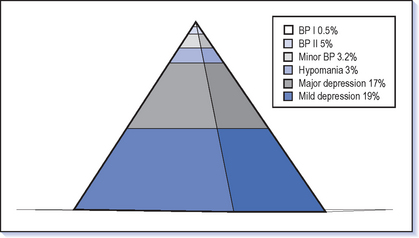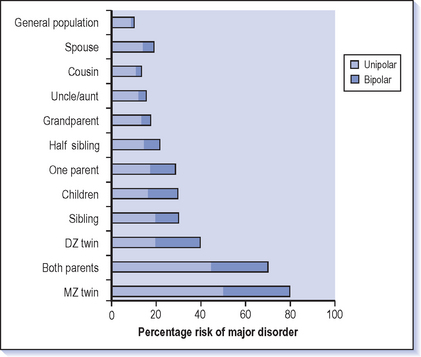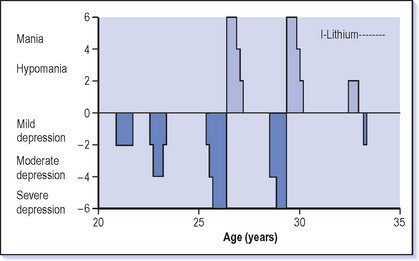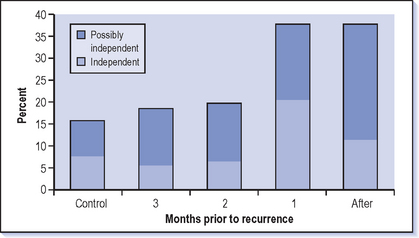2 Causes and course of the illness
CAUSES
2.1 How common is bipolar disorder?
The simplest answer to this is that it occurs in 1% of people. This seems to be true around the world in any population investigated. However, there is a spectrum from severe mania through milder forms of manic depression to recurrent depression and on to normal mood variation. It is always difficult when you have a spectrum to know exactly where to draw the lines within this to define the different disorders. Tight definitions of manic depression would give a figure of less than 1%; broader definitions which include hypomania would give figures from 2 up to 10% (Fig. 2.1).
2.2 What causes manic depression?
‘Nature or nurture, genes or environment?’ is a common question in the cause of any illness that is rarely answered definitively. For bipolar illness (particularly the more severe end of the spectrum–mania rather than hypomania) the genes/nature answer seems more likely. Bipolar illness tends to run in families and the more closely an individual is related by blood to a manic depressive the more likely that person is to develop the illness. If one parent suffers from manic depression and a child is adopted away and brought up by another family, there is still the same risk of developing manic depression as if the child was brought up by the biological parents. In the case of twins, if one twin suffers from manic depression then the chance of the other twin becoming ill is higher in cases of identical rather than fraternal twins (Smoller & Finn 2003). All of these observations indicate that bipolar illness is strongly influenced by genetic factors. However, it is not the whole story as even identical twins are not 100% concordant: if one identical twin suffers from manic depression the other will have a bipolar illness in about 50% of cases and recurrent depression in about 30%. However, there are still 20% of identical twins who are discordant, i.e. one is illness-free.
2.3 What family history am I likely to elicit from a patient with manic depression?
![]() About 70% of bipolar patients will have a close relative (a parent or sibling) who suffers either from manic depression or from serious (usually recurrent) depression. Only 20% will actually have a bipolar relative (Case vignette 2.1). The equivalent figures for the general population are about 10% (depression) and 1% (bipolar). First-degree relatives (sibling, parent or child) of someone who is manic depressive have about a 10-15% chance of having or developing manic depression (Gershon et al 1982, Gottesman 1991, Smoller & Finn 2003) (Fig. 2.2).
About 70% of bipolar patients will have a close relative (a parent or sibling) who suffers either from manic depression or from serious (usually recurrent) depression. Only 20% will actually have a bipolar relative (Case vignette 2.1). The equivalent figures for the general population are about 10% (depression) and 1% (bipolar). First-degree relatives (sibling, parent or child) of someone who is manic depressive have about a 10-15% chance of having or developing manic depression (Gershon et al 1982, Gottesman 1991, Smoller & Finn 2003) (Fig. 2.2).
2.4 How many genes are involved?
The questions that are likely to emerge include: ‘What are the normal functions of these genes?’ and ‘To what extent do we need to be liable to depression and elation?’
2.6 Which genes cause the illness?
 We would all include those with a bipolar I disorder, but would we also include bipolar II patients?
We would all include those with a bipolar I disorder, but would we also include bipolar II patients?The question of where we draw the lines around the phenotype is still one of the basic questions that need to be answered (see Ch. 1).
2.7 Who is likely to develop manic depression?
![]() There are two ways of finding people who are likely to develop a bipolar illness. The first is looking in the families of those who already suffer from manic depression, as the risks are elevated in close family members (see Q 2.3). The second way is to look amongst those who are suffering from depression but have not had episodes of mania. About 15% of those who suffer from recurrent depression will develop mania.
There are two ways of finding people who are likely to develop a bipolar illness. The first is looking in the families of those who already suffer from manic depression, as the risks are elevated in close family members (see Q 2.3). The second way is to look amongst those who are suffering from depression but have not had episodes of mania. About 15% of those who suffer from recurrent depression will develop mania.
It is not possible to predict who will develop manic depression and it is a continual surprise when those people who have been treated for depression for several years suddenly become manic (see Case vignette 4.1). However, those whose illness started at a young age (particularly in the teenage years or the twenties) and those who have frequent episodes and rapid shifts between depression and euthymia are particularly at risk (Fig. 2.3).
2.8 Does adversity bring on manic depression or cause relapses?
There have been several studies (e.g. Hunt et al 1992) that have tried to tease out these various factors which have led to the conclusion that adverse events do play a part. The first episode of manic depression is likely to be at a time of other difficulties in the person’s life, and recurrences are also likely to coincide with adverse life events (Fig. 2.4). However, the contribution from life events is small and it is best to look at them as triggers rather than causes.
2.9 Does upbringing affect the chance of developing manic depression?
Those who have had a difficult and abusive childhood are more likely to suffer from depression and personality problems. An unhappy childhood does not make anyone more liable to develop manic depression and the childhoods of manic depressives are usually normal. Those who suffer from schizophrenia are more likely to have had adverse physical problems in childhood, difficult births with obstetric complications and illnesses such as meningitis, encephalitis and head injury. However, this does not seem to be true for manic depressives–or at least not to the same extent. It is unlikely that adverse childhood experiences offer an explanation for the development of manic depression.
Stay updated, free articles. Join our Telegram channel

Full access? Get Clinical Tree









